Like many other things in life, your personality is complex and falls on a continuum. Each of us has introverted and extroverted traits - most people are in the middle of the scale. It is also possible to feel more or less introverted depending on the day or recent experiences; this feature is known as "ambiversion". In some cases, introverted people are led to believe that they are behaving wrongly, but introversion is a natural way of being and has nothing wrong with it. If you wish, however, you can take steps to bring your extrovert side closer and develop it.
Steps
Method 1 of 3: Learning about Introversion and Extroversion

Step 1. Learn to recognize the traits of an "introverted" character
Introverted people have a tendency to be quiet. They often enjoy spending time with other people, but prefer the company of a close friend or two to that of a crowd of people they don't know (this is not about shyness). Some of the differences between extroverted and introverted people probably stem from the fact that their brains process information differently. Despite popular belief, introverts don't "hate people" and aren't always shy. The following are some of the more common introverted traits:
- Seeking solitude. Introverts generally do well on their own. In many cases, they prefer to be alone most of the time. They are not afraid of other people; they just don't feel the need to be in company.
- Prefer less stimuli. This often refers to social stimuli, but in some cases also to physical stimuli. Introverts, for example, produce more saliva when they taste something acidic than extroverts. Usually, introverts don't like noise, crowds and bright lights (for example a nightclub).
- Enjoy the company of a few people or enjoy quiet conversations. Introverts may like to socialize, but even welcome social interactions usually tire them after some time. Introverts need to "recharge" themselves.
- Prefer to work alone. Introverts rarely enjoy teamwork. They prefer to work alone on things, or collaborate with one or two people.
- Appreciate routine and planning. Very introverted people don't react to new things like extroverts do. Introverts may need routine and predictability. They can spend a lot of time planning and thinking before taking action, even for the little things.

Step 2. Learn to recognize "extroverted" traits
Extroverted people love to be with other people. They are often very active and have many things to do. A common myth holds that extroverts can't be alone, but that's not the case. They just spend their time alone in a different way. The following are some common traits of extroverted people:
- Look for social situations. Extroverts are often happier when they are with other people. They interpret social experiences as opportunities to "recharge" and may feel drained or sad if they have no social contact.
- Appreciate sensory stimulation. Extroverted people often metabolize dopamine differently, feeling excited or fulfilled when they go through new and challenging experiences.
- Appreciate the attention. Extroverts are no more vain than other people, but they usually don't mind getting the attention of others.
- Feel comfortable in work groups. Extroverts don't always prefer to work in groups, but they generally have no problem doing it and this doesn't make them uncomfortable.
- Appreciate the adventures, risks and novelties. Extroverts appreciate and seek out new experiences. They can get bored easily. They may also throw themselves into an activity or experience too quickly.

Step 3. Learn that the elements of extroversion are biological
Research has shown that extroversion is linked to two regions of the brain: the amygdala, responsible for processing emotions, and the nucleus accumbens, a "reward center" that reacts to stimuli by producing dopamine. The reaction to risks and stimuli - a key factor in extroversion - is at least partly due to the brain.
- Many studies have linked the functioning of dopamine to extroversion. It appears that the brains of extroverted people are more likely to respond - and more intensely, with chemical "rewards" - to risks or successful adventures.
- Extroverted people are more looking for novelties and changes in how they use dopamine. One study showed that people with a specific gene that improves dopamine production were more likely to be extroverted than people without this gene.

Step 4. Take a personality test
The Myers-Briggs Personality Inventory, one of the main tests for assessing the introvert / extrovert dynamic, must be formulated by a professional. However, you can find many versions of this test for free on the internet. These are not as good full or professional versions as the MBTI, but they can give you an idea of your tendency towards introversion or extroversion.
16Personalities offers a short and useful free test (also in Italian) of the MBTI type. In addition to revealing your "type", it will help you understand some of the more common strengths and weaknesses associated with your dominant trait
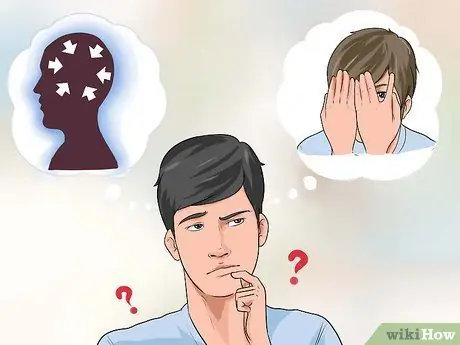
Step 5. Find out if you are introverted or shy
A common myth about introverted people is that they are extremely shy. There is also the reverse myth, which is that all outgoing people are party animals. Both of these claims are false. Shyness arises from the "fear" or anxiety of social interactions. Introversion, on the other hand, arises from a lesser innate need to socialize. Introverted people don't often start socializing, but they rarely avoid socializing.
- Research has shown that introversion and shyness have a very low correlation - that is, being shy doesn't mean you don't want to be with other people, and not wanting to be with other people doesn't mean you are shy. Even outgoing people can be shy!
- Shyness is a problem when it causes anxiety or prevents you from doing what you want to do. Support groups and self-acceptance training can help you overcome problematic shyness.
-
Wellesley College offers a free version of a shyness scale used in searches here. The quiz (in English) calculates your shyness thanks to a series of questions, such as:
- Do you feel tense when you are around other people (especially if you don't know them well)?
- Do you want to go out with other people?
- Are you afraid you don't know what to say?
- Do you feel more comfortable with people of the opposite sex?
- A score above 49 on the Wellesley scale indicates that you are very shy, a score of 34-49 indicates partial shyness, and a score below 34 indicates that you are not very shy. You can use this tool to gauge whether you should work hard to become less shy.
Method 2 of 3: Get out of your comfort zone

Step 1. Find your optimal anxiety
Psychologists claim that there is a zone of "optimal anxiety" (also known as "productive discomfort") that is just outside your comfort zone. The theory behind this claim is that the presence of anxiety, within certain limits, can actually increase productivity.
- Many people, for example, get great results when they take on a new job. As the new job makes them somewhat uncomfortable, they focus and try harder to demonstrate their skills and what they are capable of.
- It can be difficult to find your optimal anxiety zone; you will need to carefully evaluate your feelings to understand when anxiety exceeds productivity.
- An example of a situation beyond optimal anxiety is starting a new job without the training or qualifications required to perform your task optimally. In this case, the anxiety of worrying about not doing the job effectively would likely outweigh any productivity gains.

Step 2. Push yourself slightly over the edge
Pushing yourself just beyond your comfort zone can help you learn new things and accomplish goals you never thought possible. Being able to step out of your comfort zone will help you cultivate the more outgoing traits of your character, such as appreciating new things.
- Don't go too far, though - take your time. Getting out of your comfort zone too much generates more anxiety than is necessary, and your performance would suffer.
- Try to start small. For example, if you are a person who usually has classic dinners in silence, immediately eating cobra hearts still pulsating in front of a crowd of people is probably not a good idea. Try just stepping out of your comfort zone, like going out to eat sushi with a friend and trying a variation you've never eaten.
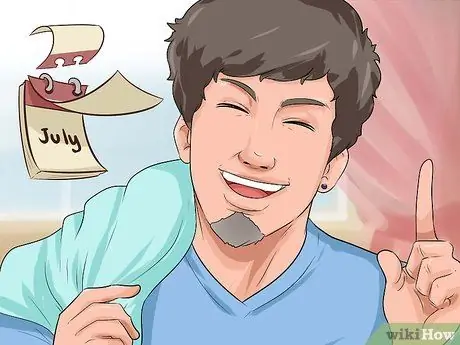
Step 3. Learn to appreciate challenges
Set yourself a new challenge each week (or as often as you like), so you get used to the change. One of the benefits of pushing yourself out of your comfort zone is getting used to the optimal anxiety this generates. By teaching your brain to appreciate new things, it will be more enjoyable to try new things.
Be aware that these challenges may initially make you uncomfortable. The point is not to immediately feel great about trying new things, but to recognize that you are capable of learning something new
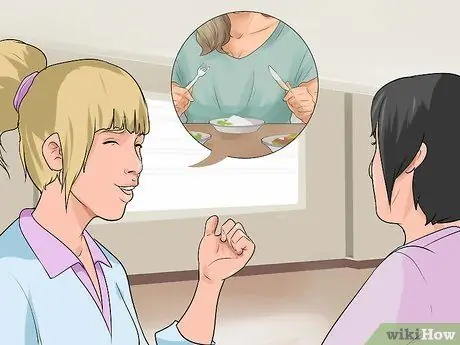
Step 4. Do something spontaneous
A trait of extroverted people is a love of new experiences and adventure. Introverted people, on the other hand, prefer to plan and evaluate every detail before taking action. Learn not to feel the need to manage your time and action plans in detail.
- This does not mean that you should abandon everything and go on an impromptu holiday in Thailand if you don't want to. As with everything else, start with the little things and become familiar with the spontaneous little actions.
- For example, go to a colleague's desk and ask if they want to have lunch with you. Take your partner out to dinner and to the movies without planning first where to go and what movie to see. Small actions like these will help you feel more comfortable with spontaneity.

Step 5. Plan group interactions in advance
When you know you are going to be in public or conducting a business or meeting, or when you are in a large group of people, prepare and organize your thoughts. This will reduce anxiety.

Step 6. Train your social skills
A common myth is that extroverts are "better" at socializing than introverts. This is not entirely true. Other people, however, may initially "perceive" extroversion as more positive because these types of people have a tendency to seek interactions with others. Challenge yourself to seek at least one social interaction next time you get the chance.
- Talk to someone at a party. It may seem impossible to take center stage as an outgoing person might. Instead, try talking to just one person. Introduce yourself by saying something like, "I don't think we've ever met before, I'm…".
- Look for other people who "do wallpaper". They could be introverted people, or just shy. Saying goodbye to them could be the beginning of a great friendship - you won't know until you try.
- Learn to exploit your vulnerability. If you feel uncomfortable approaching strangers, start there! Make a funny joke about your nervousness, for example, "I never know how to break the ice in these situations," to ease the tension and encourage the other person to talk to you.
- Plan a few sentences to say. Introverted people prefer to plan ahead, so prepare a few sentences to get conversations going. Don't choose trivial or disturbing phrases. Try open-ended questions that require more than one monosyllable answer. For example "Tell me what you do for a living" or "What is your favorite pastime?". People love to talk about themselves, and open questions invite them to converse.
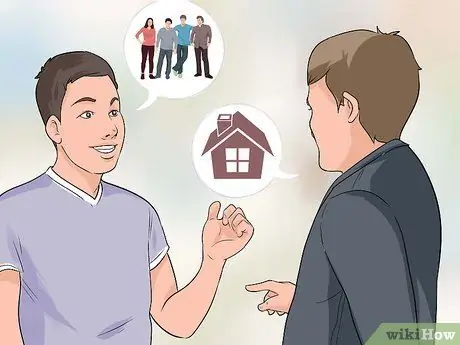
Step 7. Find the right social situation for you
If one of your goals is to make new friends, you will need to find ways to do this. There are no rules that say you have to go to discos or bars or other clubs if you don't want to. Extroverted people don't all have a favorite club to hang out with. In fact, some of them are shy! Carefully consider the type of people you would like as friends. Then, look for social situations in which you might encounter them, or create them yourself.
- Invite some friends over to your house. Ask each friend to bring a person, preferably one you haven't met yet. This way, you will meet new people in an environment that is familiar to you.
- Take online relationships to in-person meetings. If you use forums, for example, you might focus on local ones and look for real-life meeting opportunities. You won't meet people who are complete strangers, this way.
- Remember, very introverted people are often over-stimulated. You won't be able to get to know people if you have to fight a lot of distracting stimuli. Choose comfortable (or only slightly unpleasant) places and situations. It will be easier to socialize when you feel comfortable.
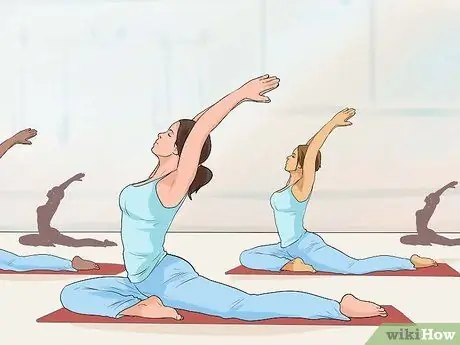
Step 8. Sign up for a training course
You can socialize while respecting your introverted tendencies. A yoga class, for example, might be perfect for you because it places an emphasis on inner meditation and stillness. Befriend the person next to you, or ask the instructor a few questions.
Remember, you won't have to talk to everyone in the room to develop your outgoing traits
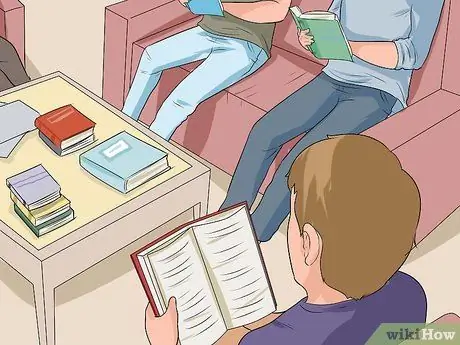
Step 9. Join or create a book club
This is a great way to turn a solitary activity into a social one. Book clubs allow you to share opinions and thoughts with other people who have similar interests to yours. Introverted people often enjoy deep conversations with a small number of people, and book clubs give you a chance to have them.
- Book clubs often don't meet regularly, such as once a week or a month. As such, they can be suitable for introverts, who generally don't want to socialize often.
- If you don't know where to find a book club, search the internet. Find a group that fits your interests well.

Step 10. Take an acting class
You might be surprised to find that many famous actors are introverts. Robert De Niro is very introverted, but he is one of the most famous actors in the world. Emma Watson describes herself as quiet and withdrawn. Acting can allow you to play a different "character" and explore behaviors that make you uncomfortable in a safe environment.
Improvisation courses can be useful for introverts. They teach you to think instinctively to develop flexibility, and to say "yes" to new information and experiences. One of the key aspects of improvisation is accepting what is given to you and continuing from there - a skill that will help you get out of your comfort zone

Step 11. Join a music group
Joining a choir, band or vocal quartet can help you find new friends. These activities can be good for introverts, because a passion for music takes the pressure off socializing.
Many famous musicians are introverted. Country legend Will Rogers and pop star Christina Aguilera are just a few examples

Step 12. Give yourself some recovery time
After pushing yourself to cope with social situations, give yourself some solitary time to recover mentally and emotionally. As an introverted person, you will need some "recovery time" to feel refreshed and ready to socialize again.
Method 3 of 3: Managing Interpersonal Relationships

Step 1. Keep in touch with other people
Introverted people may forget that not everyone feels "recharged" if they spend time alone. Remember to talk to friends and loved ones, even if just to say "hi". Being the person who initiates the contact is an extroverted trait, but it's not that hard to do, with a little practice.
Social media is a great way to learn how to make the first move in relationships. Tweet a friend. Post a funny picture of a cat on your brother's Facebook wall. Making contact with other people, even in small steps, will help you feel more outgoing

Step 2. Create guidelines for social interactions
If you are in a relationship with someone who is more outgoing than you, ask them to help you develop your outgoing traits. But it will be helpful to discuss what you like and don't like about socializing. Create guidelines to manage your different needs.
- An outgoing person, for example, may have to socialize often to feel fulfilled. Even if you are trying to be more open and social, you may still not want to socialize as much as your partner. Allowing your partner to go out alone will allow you to stay home and recharge, and both be happy.
- You can ask your partner to invite you to social situations. Even if you don't necessarily feel ecstatic about going, try going out from time to time. Having someone you know and trust accompany you will help you feel more at ease.
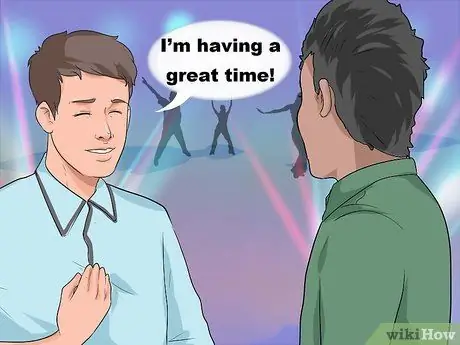
Step 3. Tell other people how you feel
Because they are so focused on their inner self, introverts may not always remember to express their feelings to others. It can be difficult for other people, especially those who are very outgoing, to understand if you are having a good time or if you would like to hide. Tell other people how you feel before they have to ask you.
- For example, if you are at a party with friends, you might say "I'm having a blast!". You may naturally be reserved or quiet, but that doesn't mean you have to be a complete mystery.
- Likewise, if you feel tired in social situations before others - and it can happen - make it clear. You can say something like "I really enjoyed it, but now I'm getting tired. I'm going home. Thanks for a nice evening!". That way, other people will know you enjoyed it, but you can also assert your right to go home and recharge.
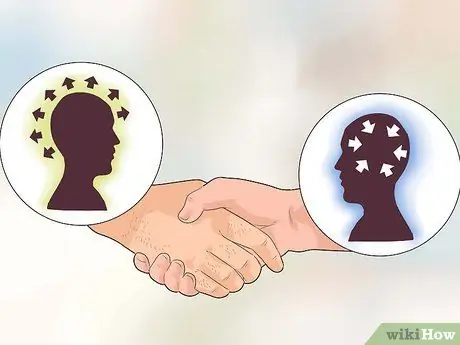
Step 4. Respect your differences
Introversion and extroversion are just different ways of being - one is not superior to the other. Don't feel inferior because you react to situations differently than friends and family do. Likewise, don't judge other people for how they react to situations.
It is unfortunately common for extroverts to stereotype introverts as "people who hate others" or "boring". It is also common for introverts to generalize about extroverts and assume that they are "superficial" or "chaotic". Don't think that you have to belittle "the other side" to appreciate who you are. Each type of person has their strengths and weaknesses
Advice
- Being introverted and shy are not the same thing. An introverted person loves solitary activities more than social ones, while a shy person avoids social ones out of fear and anxiety. If you would like to talk to people and socialize but feel paralyzed or don't have enough self-esteem, you probably have to struggle with shyness.
- Introverted people find social situations exhausting. If you are too, don't force yourself to socialize when you need some time on your own.
- Although shyness and social anxiety are problems that can be addressed and resolved, introversion is a basic personality trait that generally remains stable throughout life. It is best to accept your personality and recognize your worth.






